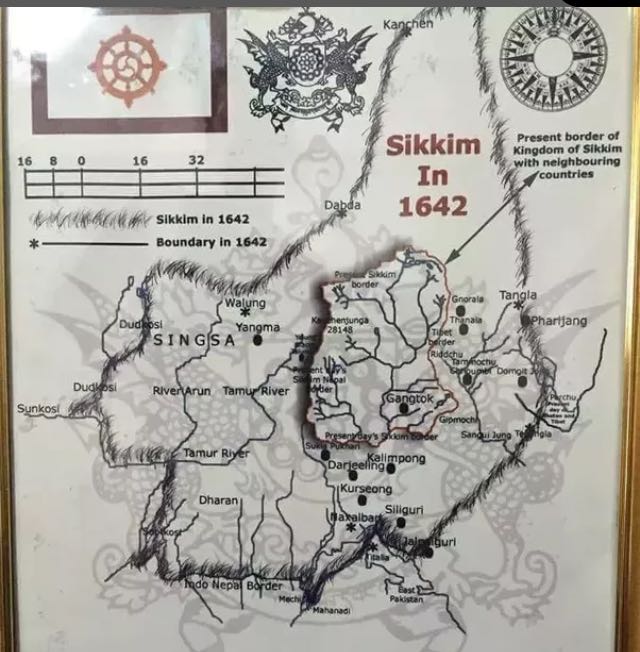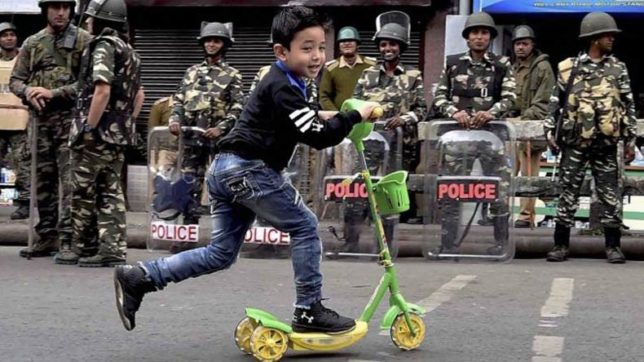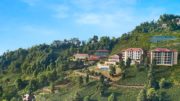Despite Darjeeling area being a part of the Sikkim Kingdom under the Namgyal rulers (1642-1835) and her people having “naang ra masu jasto” historico-cultural ties with Sikkim, our destinies were altered when the British took over Darjeeling in 1835, developed and retained it with them up until 1947. When the British left India, repeated requests had been made by the then Chogyal – Tashi Namgyal post-1948 onwards, to the Government of Independent India (GoI) for the return of the tract of land that today comprises the Darjeeling Hills. Instead, the GoI simply followed the British practice and retained this “contentious” tract of land (where we today reside) by paying an annual royalty to the Chogyal of Sikkim up until 1975. What differed this time though was that, unlike the British who ushered in infrastructural and economic development in Darjeeling making it the hub of economic activities, under GoI (and particularly under West Bengal Government post-1950s), Darjeeling quickly lost its place as the premier financial and economic centre in all of North East India.
With the merger of Sikkim Kingdom as India’s 22nd State in 1975; the fate of Darjeeling and her people were sealed forever, because with it, died all the possibilities of getting back to where we once “belonged”. Thus making us Darjeeling residents – “bhir ko chinde, na undho, na umbho”.
So while we hung there in a limbo these many years, the socio-economic status/conditions of the people in both Sikkim and Darjeeling indeed underwent severe changes. While Sikkim post-1975 experienced a fast track trajectory of growth and development as the State of India; Darjeeling Hills, witnessed aggressive natural resources exploitation, systematic domination, deprivation and marginalization under all regimes of the West Bengal Government. Not to forget, our constant encounters with extreme, recurring violence perpetuated, instigated and probably even planned by Bengal to suppress our aspirations – aspirations to be free, to live with our heads held high in dignity, to legitimize our rooted connection to our land, to be treated as an equal.
The assumption of a Darjeeling-Sikkim, this time around was based on a rumour fuelled by someone, who is now in jail in Sikkim on corruption charges. His fear-mongering has had a quick trickledown effect and severe concerns are brewing among the common people not only in Sikkim but also in Darjeeling. In an attempt to resurrect a downward spiralling political career; and the fates and fortune of his party, by floating the “merger” rumor, this individual unethically tried to politicise and cash upon the plights and sufferings of the people from Darjeeling Hills who are currently struggling for a separate state of their own within the Union of India.
Much like how Mamata Banerjee succeeded to create or revive a kind of “Bengali nationalism” across Bengal on Bengali language issue, only to strengthen her vote banks, this jailed individual and his supporters are spreading fear amongst the Sikkimese people to revive a similar “Sikkimese nationalism” grounded upon manufactured threats from “assumed merger” aka threats from us – Darjeeling denizens. The agenda behind such reckless actions could only be to put the current SDF government on a back foot and garner renewed public support on the planks of “Sikkimese nationalism”.
However, now that this “assumption – of Darjeeling Sikkim merger” is already doing the rounds in Sikkim and Darjeeling, I cannot but clarify a few things as someone from the “other-side”. This is being written to refute the concerns raised in Mr SD Tshering la’s article.
Even in the unlikeliest of possibilities, foremost, if Darjeeling and Sikkim do get merged, why would there be any questions of Darjeeling MLAs or Sikkim MLAs. We were one people and we will be one people – electing MLAs from different parts of the same State. To assume that only one part of the State will thus gain while the other part doesn’t, that too in such a small geography is absurd at best, and ridiculous at its worst. However, may be the concerns raised by Mr SD Tshering arose from the fact that West Sikkim is completely neglected while East Sikkim continues to get the budgetary largess. Could this be because West Sikkim sends lesser MLAs than the rest of the State? If that be the case, then what explains the development of North Sikkim than the relatively slower pace of development in the South?
Secondly, the claim that “Sikkim will lose more while Darjeeling will gain as the biggest impact will be on the political scenario with Sikkim being relegated to a minor political player in the New State” does not quite make sense given Sikkim’s past and current political scenario. Such claims have been grounded on the relation between populations of an area to political representation, which on a cursory glance creates panic in Sikkim or anywhere else. However, if population and political representation really be directly proportional, how does one account for the 12 Bhutia-Lepcha seats in the Sikkim State Assembly? If local rights and political entitlements can be protected under Sikkim [Article 371(F)], there is no reason why it cannot be so in the case of a merger?
To those in Sikkim, the allure of a possible Darjeeling Sikkim merger may seem like something the people from Darjeeling would naturally crave for, however, for those in Darjeeling, the decades of pain and agony of subjugation, humiliation and violence perpetrated against us will only be corrected if we have a state of our own. Merger with Sikkim will do much more injustice to the people of Darjeeling and the decades of sacrifices that we have made – the lives that were lost, the families that were torn apart, the generations of youth we lost, the scars that we still carry in our hearts and minds.
Perhaps, merger with Sikkim in this regard, can only be a procedural step to facilitate (speedy) separation from West Bengal (as Sikkim is the only State that actually has legitimate claim on Darjeeling Hills), so that the due process to grant Darjeeling Hills a separate state immediately post-merger can be initiated by the Sikkim State Assembly, which in the year 2011 had unanimously passed their resolution, commitment and support for Gorkhaland.
This is not to say that I am in favour of any kind of a merger, as this will grossly undermine the fundamental premise as to why we are seeking Gorkhaland in the first place. Merger with Sikkim will not resolve our “identity” issues. Gorkhaland is being demanded so that the Gorkhas living across India have a representative state, and merger with Sikkim will never allow that to happen. Just like how the very notion of “Sikkim Subject” pre 1975 and(or) “Sikkimese” post 1975 i.e. people’s identity with Monarchy/State, transcended ethnicities, caste and religion; and unified the people of Sikkim under these umbrella terms i.e. Sikkim Subject/Sikkimese; we aspire and dream for a similar collective identity of our own with respect to our land/possible State, that too transcends the barriers of ethnic/caste/religion divides and fractures – our “Gorkha” identity. Therefore, the question of the merger is no answer to our existing problems.
For us, Sikkim and the people of Sikkim remain our brothers and sisters in blood and we will consciously not permit “their” identity to be threatened in any way, shape or form. More importantly, no one would be more conscious of the value of the “identity” that you all carry.
In any case, indeed “much water has flowed down the Teesta” since Darjeeling was “lumped” and not “merged” with West Bengal (just like how for many Sikkimese, Sikkim was annexed by India in 1975). But much like the Teesta today, dammed and controlled; “our” existence across the border has also been damned and controlled, unfortunately, shaped by our shaped history, and if “we” do not continue with our struggle, in a few years to come, “our existence” will be strategically and politically eroded. Therefore, refraining and not fuelling these rumours with statistics will not only help our struggle across the border but will also not scare away that one staunch support that we have received so far from our neighbours in Sikkim.
Lastly, for those who believe Darjeeling will be some kind of economic liability, here is a food for thought. The entire budget of Sikkim is around Rs.7000 crores, whereas Darjeeling district alone contributes over Rs.13000 crores to the West Bengal exchequer. Imagine the economic possibility of a Gorkhaland state, once all this revenue is spent in our own region and not used to pay off the debt incurred by the West Bengal Government.
When Gorkhaland statehood is finally realized, Sikkim will benefit much more than all of you have imagined, because the trickledown effect of a rich and prosperous neighbour is immense. Just as how today numerous people from Darjeeling are earning their livelihood in Sikkim, people from Sikkim will have the possibility to do the same in Gorkhaland, helping us all raise our standard of living.
*R D Dukpa writes for www.darjeelingtimes.com and is Editor at The Darjeeling Chronicle.






Be the first to comment on "Indeed “A Tragedy In The Making”: Merger With Sikkim Will Do More Injustice To Darjeeling, Her People And Her Decades Of Struggle"